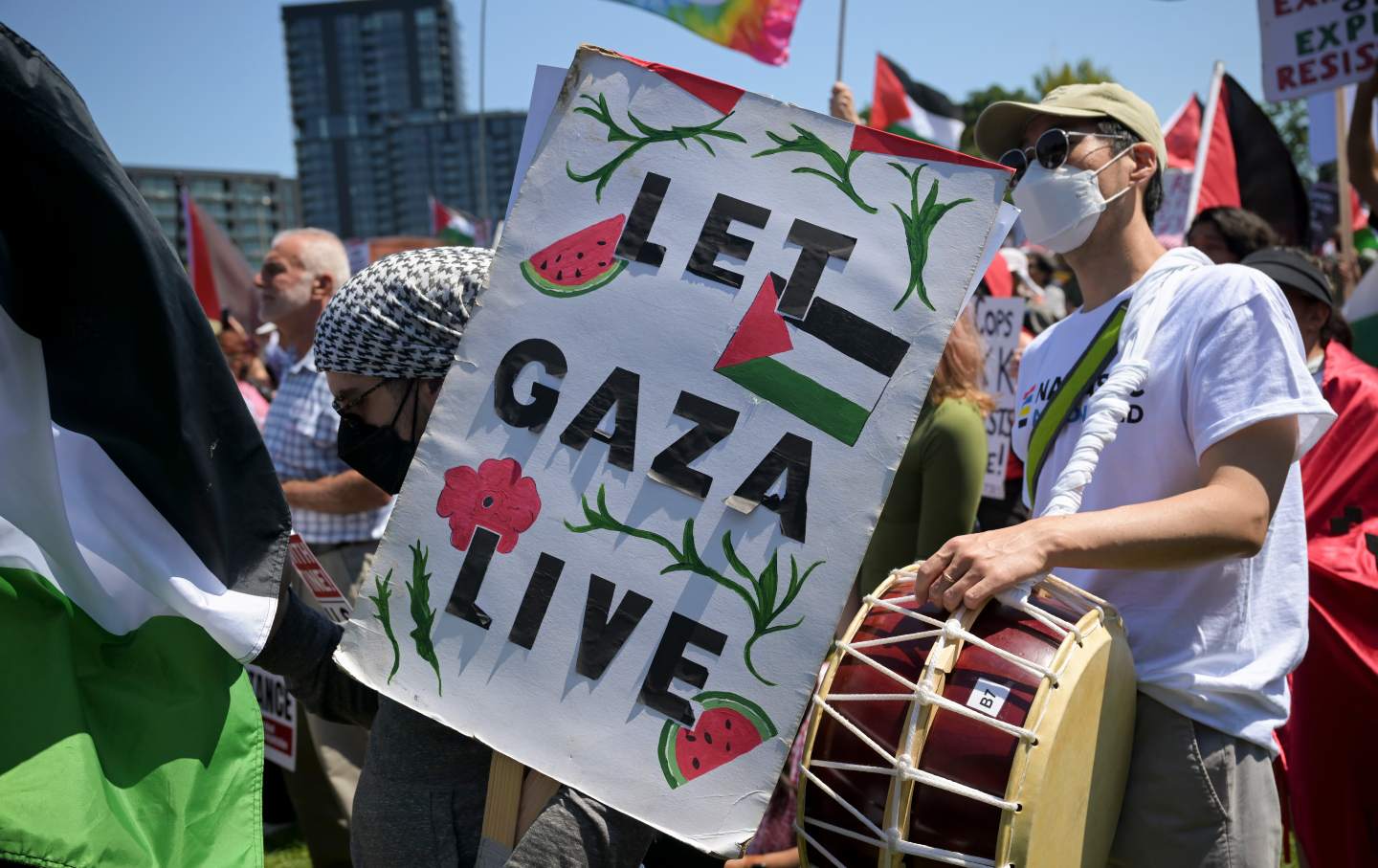
Activism
/
August 19, 2024
The call to stop sending arms is no fringe demand. It has a huge base of support, and the DNC can’t ignore it.
A demonstrator carries a sign ahead of the Democratic National Convention (DNC) near the United Center in Chicago, Illinois, on August 19, 2024.
( Victor J. Blue / Bloomberg via Getty Images)
Chicago—Muhammad spoke so loudly into the microphone that feedback screeched out of the speakers, yet the noise was drowned out by the crowd cheering and drumming in the blazing sun. He was standing on a stage looking out at Chicago’s Union Park, filled with thousands of protesters preparing to march, less than half a mile away from the United Center, where the Democratic National Convention was set to commence evening programming in a few hours.
Muhammad, an organizer with the Palestinian Youth Movement who asked that just his first name be used, had a message for Vice President Kamala Harris: “We are done with your words and platitudes,” he said to the crowd. “We demand action. We demand an end to Israel’s war, and a total arms embargo.”
This demand—for the United States to stop sending weapons to Israel—reflects a growing consensus across movements that are mobilizing in solidarity with Palestinians. After 10 months of ceasefire talks that have gotten nowhere and as the US continues to ship weapons and disburse its hefty Israel aid package, activists are increasingly focused on trying to convince Washington to cut off the arms flow. This is a demand with a considerable base of support: Both the Uncommitted National Movement representing 740,000 uncommitted voters and unions representing nearly half of all union members in the US are calling for a stop to arms shipments to Israel.
Current Issue
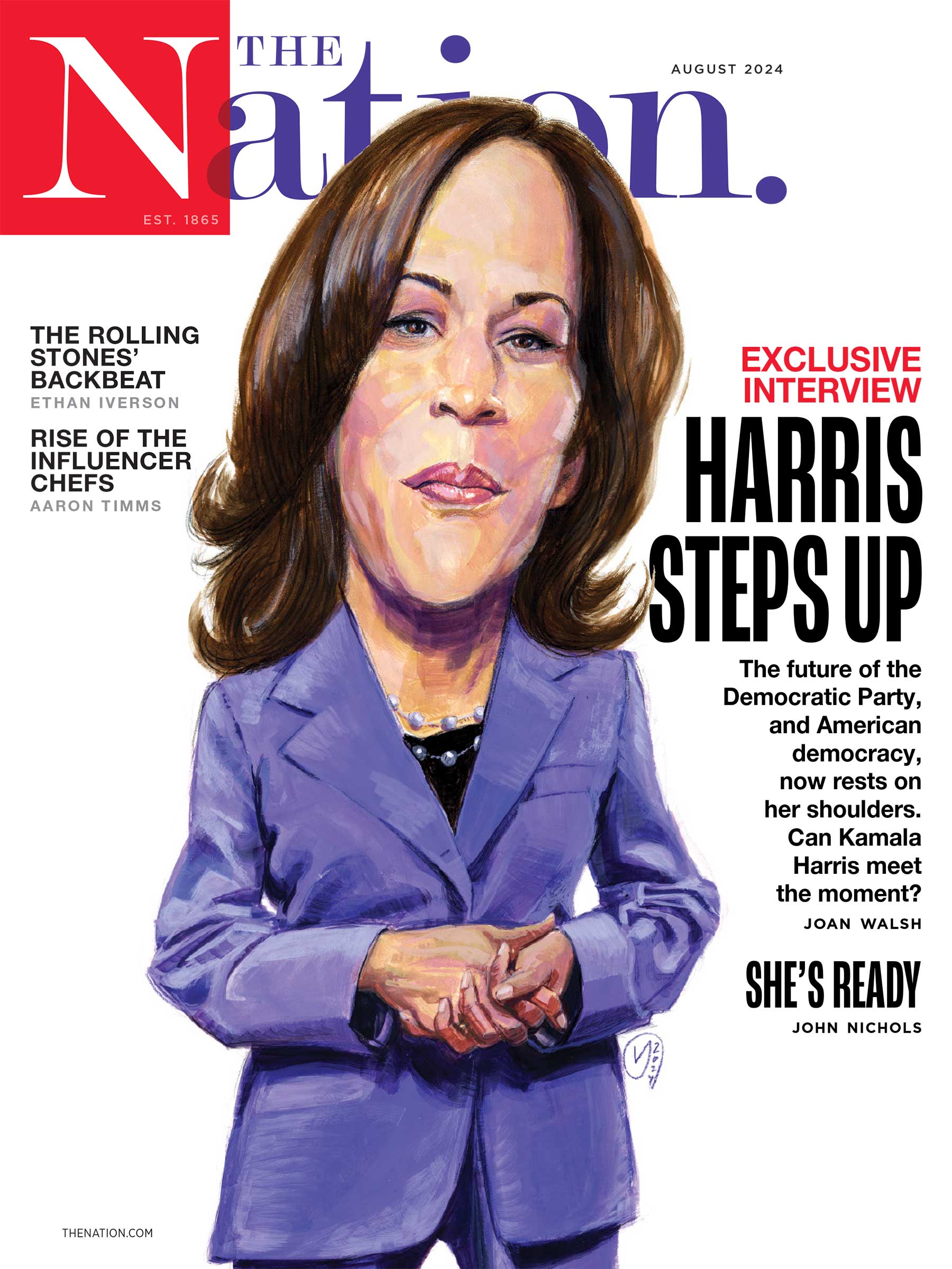
Now, thousands of protesters gathered in Chicago are uniting behind the demand to cut off all aid to Israel and end the genocide in Gaza. These demands go beyond the call for an arms embargo, but share the emphasis on stopping material support. As Israel inflicts a daily death toll that is unprecedented in the 21st century, the Coalition to March on the DNC—composed of more than 250 organizations mobilizing across a variety of issues, from migrant rights to labor rights to opposing police violence—decided to center Palestine and Gaza. The Chicago metro area has the largest Palestinian diaspora community in the United States, and the Coalition to March on the DNC doesn’t want a return to the old status quo, because Israel’s injustices against Palestinians pre-date the last 10 months.
The Democratic Party is eager to use the DNC to showcase the Harris-Walz ticket, and seems less excited to host a genuine debate about the Biden administration’s ongoing support for Israel, which has killed 40,000 people in Gaza, more than 16,000 of them children. The actual toll in Gaza likely surpasses the official numbers of the Gaza Health Ministry. When considering both direct and indirect deaths, the number could grow to 186,000 or more, according to one analysis in The Lancet, a British medical journal. In October, Israeli Defense Minister Yoav Gallant said, “We are fighting against human animals,” and experts have since warned that Israel’s actions are genocidal, with the International Court of Justice determining in January that it is “plausible” that Israel is committing genocide.
But the Democratic Party may not be able to dodge controversy, facing challenges both outside and inside a convention known for its pageantry and spectacle. And the concerns of those seeking to stop the arms flow cannot be dismissed as fringe. Polls show Democratic voters overwhelmingly support a ceasefire in Gaza. And recent polling conducted by YouGov, commissioned by the Institute for Middle Eastern Understanding Policy Project, found that supporting an arms embargo could help win over Democratic and independent voters in swing states. In Pennsylvania, for instance, more than a third of Democrats and independents said 34 percent said that they would be more likely to vote for the Democratic nominee if the Biden administration promised to withhold weapons to Israel, compared to just 7 percent who say they would be less likely, according to a summary of the findings.
For Muhammad, the underlying reason why protesters are gathering is simple: “Best believe we are not here by our own will, but because the Democratic Party has forced us to be here. Because they continuously play performative politics and utter the word ‘ceasefire’ while they send more checks to Israel.”
Before the speeches began, Nashwa Bawab, a member the Palestinian Youth Movement, stood near the stage and explained, “The Biden administration has taken the teeth out of the ceasefire demand, which is why the demand has shifted toward centering ending US military aid to Israel.”
Popular
“swipe left below to view more authors”Swipe →
Republicans often use even stronger language than Democrats to denigrate Palestinians, and the Trump camp is openly supportive of Israel’s annexation of the West Bank and expulsion of Palestinians from Gaza. But support for Israel is an area of long-standing and broad bipartisan consensus in Washington, well-encapsulated by the career of President Joe Biden, who has continued some of his predecessor’s policies, like moving the US embassy to Jerusalem. Harris has not broken from the administration she serves in, and while she has employed more sympathetic language about the suffering of Palestinians than Biden, activists say that tone means little while the flow of weapons continues unabated. Harris, so far, has refused calls for an arms embargo.
“There are people who are upset that we are criticizing and holding the Democrats accountable, that somehow that gives power to Trump,” Nesreen Hasan, an organizer with the Palestinian Feminist Collective and the Chicago chapter of the US Palestinian Community Network, bellowed from the stage. “We recognize Trump and Project 2025 are dangerous. We know the dangers of his administration and his son-in-law Jared Kushner’s racist rhetoric and colonial ambitions to further colonize Palestine.”
“So that’s why we marched at the RNC in Milwaukee as well,” she added, “to oppose the Republicans’ racist and reactionary agenda, and why we protested Trump when he showed his face in Chicago. Currently, it’s the Democrats who are playing the leading role in funding and aiding the genocide, while at the same time overseeing a deterioration in rights for working and oppressed people right here at home.”
As protesters march outside, some are planning to mobilize inside the DNC. Among them is Abbas Alawieh, an uncommitted delegate from Dearborn, Michigan. For him, the stakes are personal. Alawieh’s family emigrated from Lebanon to the US when he was 6 years old, and nine years later, he found himself trying to survive a US-backed bombing campaign. The year was 2006, and he was visiting his grandmother in southern Lebanon when Israel went to war with Hezbollah, carrying out widespread bombardments, including extensive use of cluster munitions, that heavily targeted residential areas, killing over 1,000 Lebanese civilians. “I was certain I would die,” Alawieh said in a soft voice, as we sat by the window of a training space in Chicago’s West Loop, the day before the protest.
Then—as now—Israel relied on US weapons and aid for its military operations. “This was the first time I had to contend with why my own government was sending bombs to kill kids like me,” said Alawieh, now 33. “I don’t see the humanity of kids in Gaza as any different from my own. I feel an obligation as an American to shout this from the rooftops.”
Alawieh is one of 29 uncommitted delegates who have journeyed to the DNC to represent those who voted “uncommitted” in the Democratic primaries to protest the Biden administration’s weapons shipments and political support for Israel as it bombs and besieges Gaza. He is one of two delegates hailing from Michigan, the state is “the birthplace of the Uncommitted movement,” as Eman Abdelhadi described it in an article for In These Times. We were speaking the day before the DNC was set to begin, at a gathering of uncommitted delegates and movement organizers, in a space whose walls were lined with banners with “Not Another Bomb” in black letters, ringed with red poppies. Delegates ate food and mingled with members of the press, a brief lull before hours of scheduled trainings and meetings to prepare for the coming days.
The uncommitted delegates want to pressure Vice President Kamala Harris to agree to an embargo on arms shipments to Israel, pursuant to a permanent ceasefire. So far, they have organized dozens of Harris delegates to sign on to a call for an arms embargo, and they plan to get that number higher over the coming days. Neither the delegates nor the movement are making an endorsement until they see evidence that Harris is willing to take a new direction on Palestine.
Focusing on stopping the weapons is important, they say, at a time when the sense of the word “ceasefire” has become muddled. “Saying you support a ceasefire while sending more bombs that undermine a ceasefire is hypocritical,” he said. The demand to cut off this flow, he said, “is trying to center what’s at the heart of the problem.”
The uncommitted delegates have other demands too. They want time to speak on the floor, and they want Harris to explain how she’s going to stop sending weapons to kill civilians. While these demands have not been met, they did get a panel and vigil at the DNC. They insist that, in opposing Israel’s actions, they represent the majority of Democratic voters. While the Uncommitted National Movement does not have the same exact demands as the Coalition to March on the DNC, Alawieh said he has “a lot of respect” for what the protesters are demanding.
Alawieh formerly served as the chief of staff for Representative Cori Bush—who was recently ousted from Congress thanks, in large part, to millions of dollars of pro-Israel donations to her opponent—and has also previously worked in the offices of Representatives Rashida Tlaib and Andy Levin. Some members of his family in Lebanon see Alawieh as someone to call when they are worried about US and Israeli policy. There is cause for concern amid increasing danger that Israel’s onslaught on Gaza could turn into a wider regional war. His aunt, who lives in southern Lebanon, “is calling me all the time,” he said. “She says she is sleeping with her shoes under her pillow in case she has to run.”
“Are we going to see the people on the receiving end of these bombs in their full humanity?” he said. “We need the killing to stop immediately”
Layla El-Abed, also from Dearborn, is a cofounder and co-director of the Uncommitted National Movement. As a Palestinian American with family in the West Bank, she described, “a feeling of guilt, because we can’t stop what we are doing until we see a liberated Palestine.” El-Abed is a community organizer in Detroit, where she works alongside people dealing with poverty and soaring housing costs.
More on the 2024 Democratic National Convention:
“Most Americans struggle to keep lights on, and food in the fridge,” she said. “But we send a blank check to Israel as they carry out a siege on Gaza.”
In late July, seven major unions, which together account for nearly half of all union members in the Unied States, publicly called on Biden to “immediately halt all military aid to Israel as part of the work to secure an immediate and permanent ceasefire in the war in Gaza.” Signatory unions included the National Education Association, the largest union in the US, which counts Jill Biden as a longtime member, and the United Auto Workers, whose strike against the big three automakers last fall captured nationwide attention. The focus on ending the arms flow is a considerable escalation from previous, widespread calls in the labor movement for a ceasefire, because it aims to cut off material support.
Jackson Potter, vice president of the Chicago Teachers Union, attributes this to the fact that “you have more rank-and-file-oriented leaders in positions of power responding to members who want more investment in social services and health care, not the war machine.”
Speaking over the phone the day ahead of the protest, he added, “This is the largest anti-war movement within labor in a generation, if not longer.”
Can we count on you?
In the coming election, the fate of our democracy and fundamental civil rights are on the ballot. The conservative architects of Project 2025 are scheming to institutionalize Donald Trump’s authoritarian vision across all levels of government if he should win.
We’ve already seen events that fill us with both dread and cautious optimism—throughout it all, The Nation has been a bulwark against misinformation and an advocate for bold, principled perspectives. Our dedicated writers have sat down with Kamala Harris and Bernie Sanders for interviews, unpacked the shallow right-wing populist appeals of J.D. Vance, and debated the pathway for a Democratic victory in November.
Stories like these and the one you just read are vital at this critical juncture in our country’s history. Now more than ever, we need clear-eyed and deeply reported independent journalism to make sense of the headlines and sort fact from fiction. Donate today and join our 160-year legacy of speaking truth to power and uplifting the voices of grassroots advocates.
Throughout 2024 and what is likely the defining election of our lifetimes, we need your support to continue publishing the insightful journalism you rely on.
Thank you,
The Editors of The Nation
More from The Nation
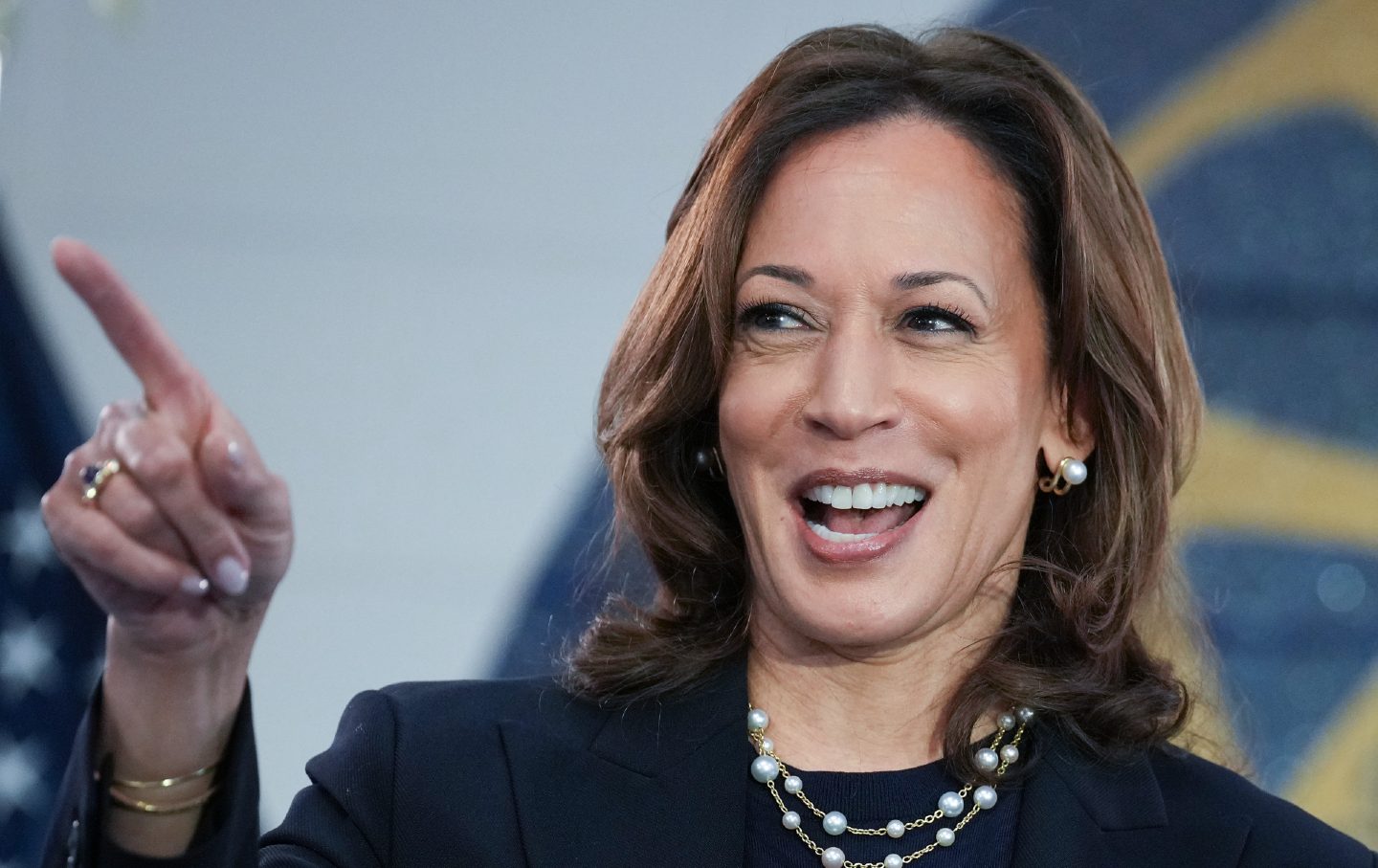
By sharing her compelling story, the Democratic nominee can put her party firmly on the path to victory.
Jeet Heer
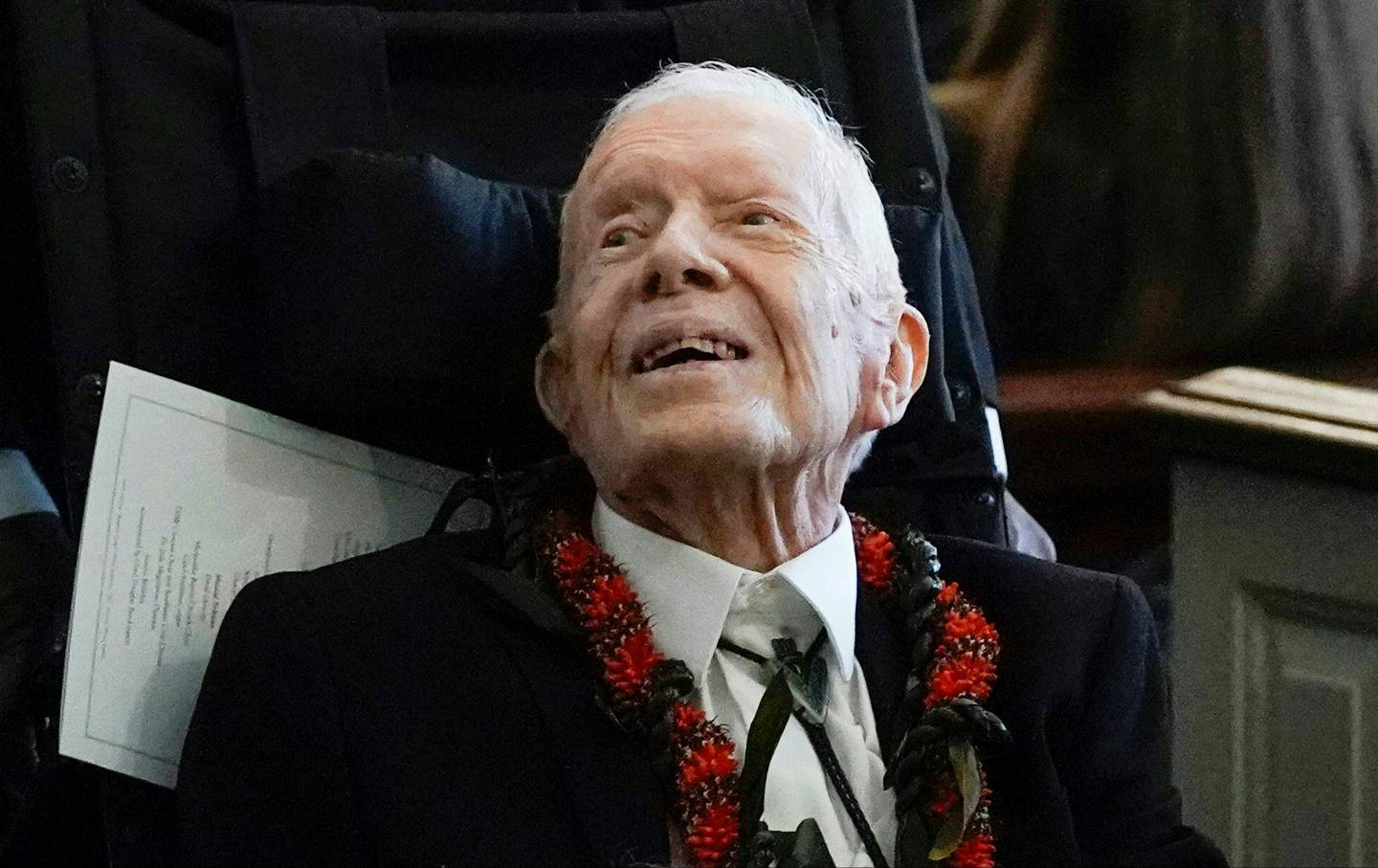
Jimmy Carter was born at the height of Jim Crow. Now, he wants to live long enough to help send a Black woman to the White House.
John Nichols
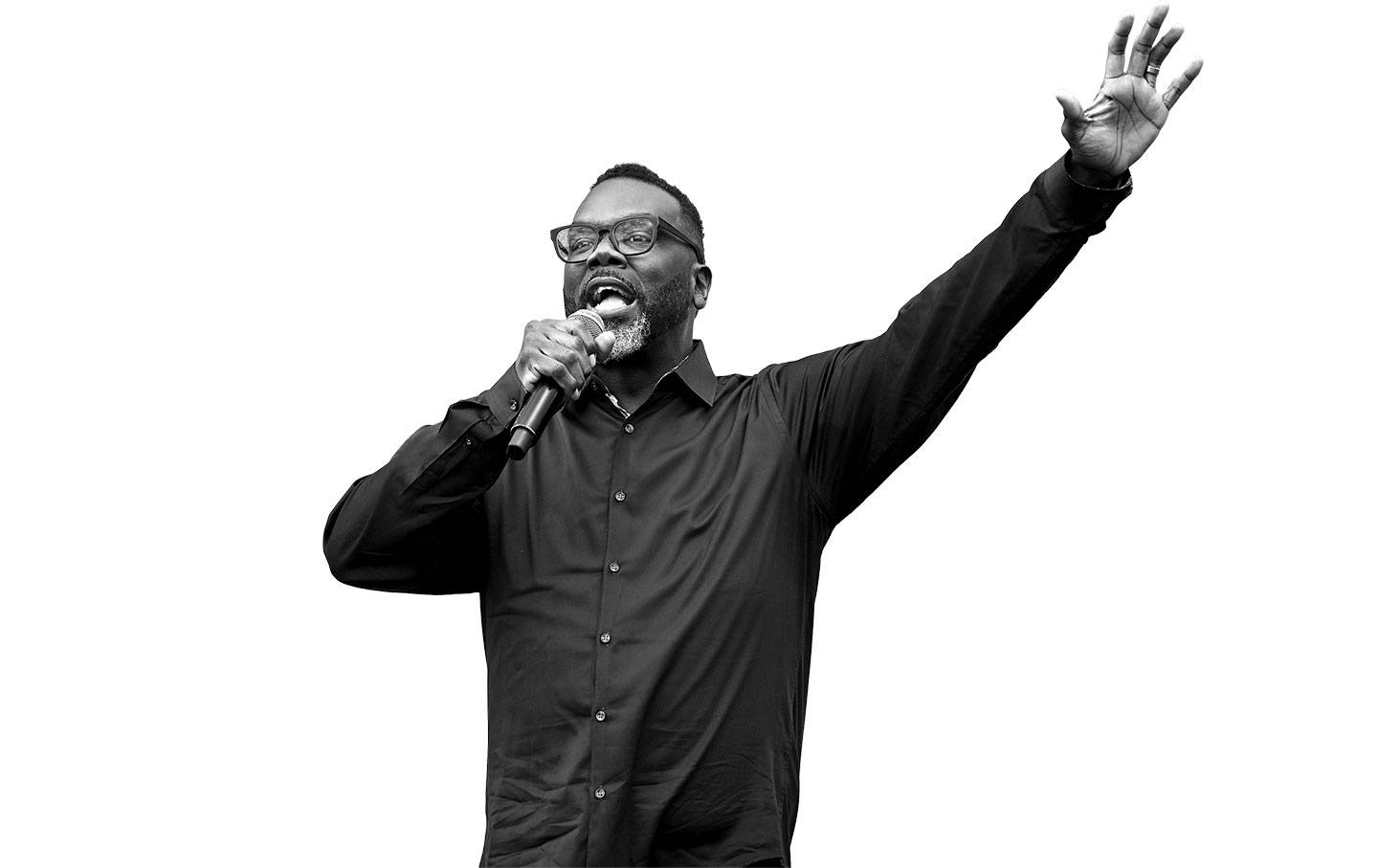
A conversation with the Chicago mayor about his vision for progressive governance and the City Council’s vote calling for a ceasefire in Gaza.
Q&A
/
John Nichols

A conversation about MAGA’s militancy and the strategies to protect Democracy.
Q&A
/
Laura Flanders

Insecure and contemplating defeat, the former president returns to a familiar script.
Jeet Heer